Circulating Flash Evaporator (CFE)
Say goodbye to costly buildup – effectively concentrate and crystallize even the most difficult wastewater.




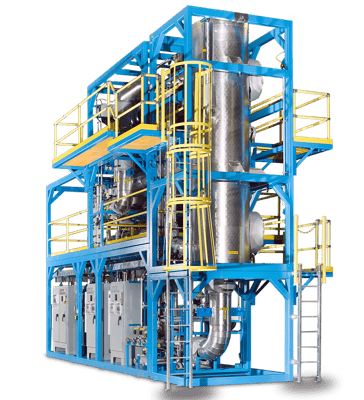
Evaporation is a time-tested & cost-effective method for reducing the volume of water-based waste
Hauling is Costly
Industrial and commercial facilities that generate wastewater spend too much money paying for hauling & disposal of waste streams that are mostly comprised of water.
Evaporation is Cost Effective
ENCON Thermal Evaporators are utilized by 2,000+ facilities worldwide to evaporate the water portion of water-based wastes, reducing hauling/disposal volumes and cost by up to or even exceeding 99%.

Advantages of ENCON CFE Evaporators
- Can handle different waste streams simultaneously
- Can handle very challenging and complex waste streams
- Dramatically reduces disposal volume & cost
- Eliminates sewer discharge accountability
- Achieve ZLD
- Safe to operate 24/7
- Low operating costs
- Requires less operator intervention than most wastewater treatment technologies
- Very effective for process stream concentration
Circulating Flash Evaporator (CFE)
ENCON Evaporators custom designs and builds each CFE Evaporator to each customer's individual wastewater characteristics. This allows us to provide the lowest possible operating cost while also providing the full purchased evaporation rate, which is often not possible with "one size fits all" designs.
Each system’s mass and energy balance is created specific to the client application. All evaporator components are selected specifically for client application and client preferences. ENCON will provide full P&ID created to client's specific application and process. Custom design also allows the correct materials of construction to be utilized for corrosion resistance
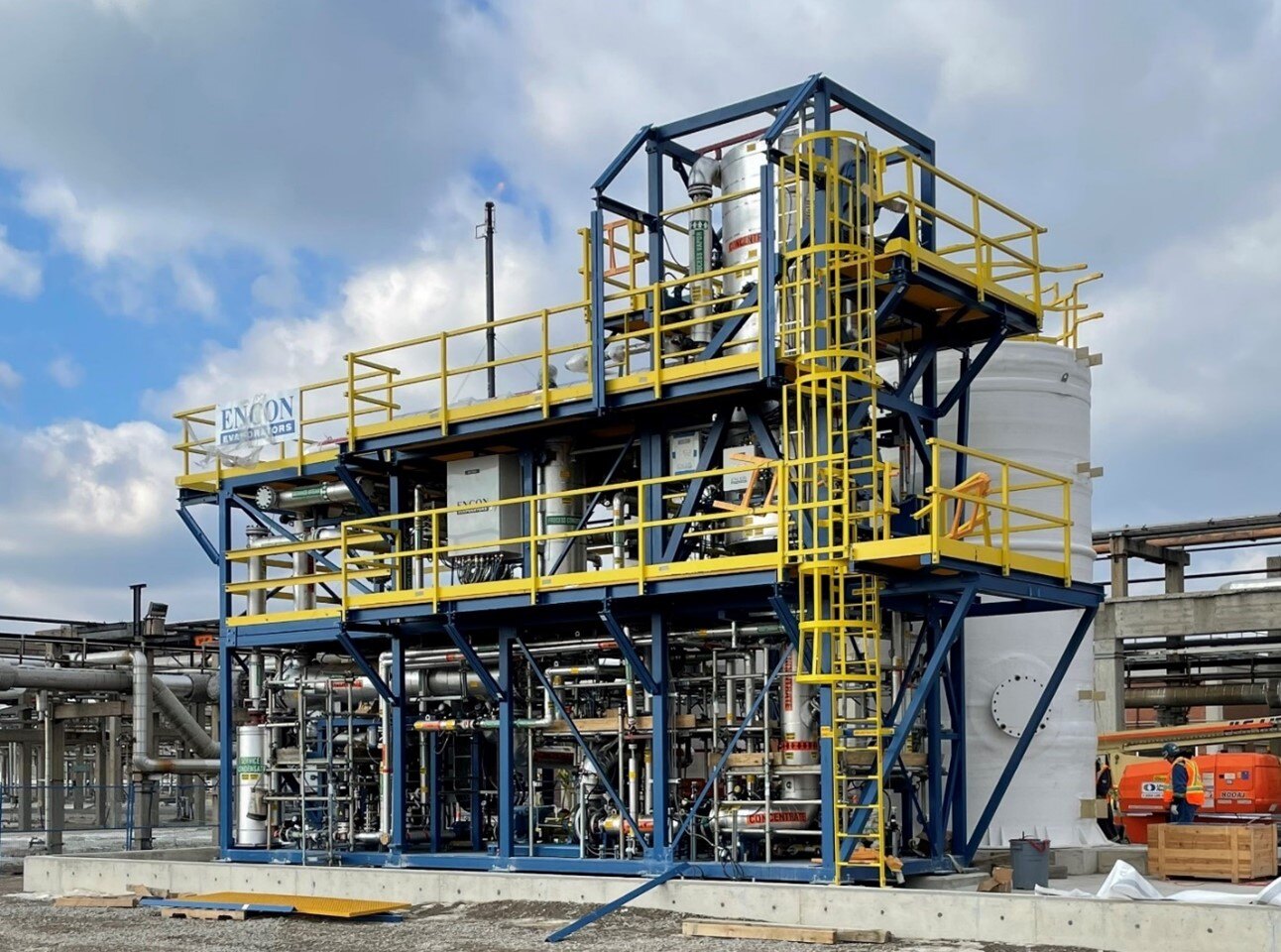
Features
 ENCON CFE system comes standard with Allen-Bradley controls. The ENCON system is fully automated from start-up all the way through to automated CIP cycles.
ENCON CFE system comes standard with Allen-Bradley controls. The ENCON system is fully automated from start-up all the way through to automated CIP cycles.
Automation includes: wastewater feed, automatic discharge of concentrated residue from the Separation Tank, automatic transfer of distillate from the distillate sump, and automatic cleaning (Clean-in-Place) of heat exchangers. Numerous variables such as temperature, pressure, and water level are monitored continuously, and will trigger various alarm conditions that notify the operator of deviation from normal operating mode.

- Vaned process vessel inlet device to minimize droplet formation and dissipate force into the separation tank.
- Vessel diameter carefully designed for optimal droplet disengagement.
- Chevron vane pack mist eliminator (alloy matches vessel) for removal of larger droplets and decreased loading on mesh mist pad.
- Mesh mist pad (alloy matches vessel) for small droplet removal
 Heat exchangers are used on ENCON MVC Evaporators to recycle the energy from the vapor generated from the circulating waste stream. This vapor contains a large amount of energy in the form of latent heat. There are two types of heat exchangers that may be used on an ENCON MVC Evaporator, depending on the application.
Heat exchangers are used on ENCON MVC Evaporators to recycle the energy from the vapor generated from the circulating waste stream. This vapor contains a large amount of energy in the form of latent heat. There are two types of heat exchangers that may be used on an ENCON MVC Evaporator, depending on the application.
Plate and Frame Heat Exchanger:
This type of heat exchanger uses metal plates to transfer heat between two liquids. The major advantages of
 this type of heat exchanger are a compact footprint and that the fluids are exposed to a much larger surface area because the fluid spread out over the plates, which facilitates the quick transfer of heat.
this type of heat exchanger are a compact footprint and that the fluids are exposed to a much larger surface area because the fluid spread out over the plates, which facilitates the quick transfer of heat.
Shell and Tube Heat Exchanger:
As the name implies, this type of heat exchanger consists of a shell with a bundle of tubes inside. One fluid runs through the tubes and other fluid flows over the tubes to transfer heat between the fluids. This type of heat exchanger has a larger footprint than a plate & frame heat exchanger, but has the advantage of being much more resistant to scaling and fouling.
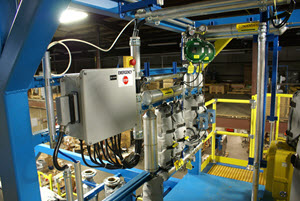
- Pneumatic system depressurizes and is lockable
- Lockable low point drains for complete removal of fluids from process piping
- Components located within easy operator reach to minimize requirement of ladders and fall protection
- Work platforms with OSHA compliant railings and ladders for easy operator access to all components
- LOTO instructions included with equipment manual
- All vessels designed to ASME section VIII pressure vessel code
- Mechanical over pressurization relief devices
- E-stops located at all operator workstations/areas
- Failure position of each device scrutinized to ensure failed position is safe position
ANSI/API Centrifugal Pumps - feed and recirc.
- Typical is Gould's 3196 XLTi or Sulzer CPT
- Double Mechanical Seals
 Seal pot system for mechanical seals
Seal pot system for mechanical seals- Open Impellor for handling solids
- Bearing case separated from liquid end of pump
- Motor separated from bearing (long shaft design)
Electric Motor Protection – Blower(s) and Recirc Pump
- Over temperature protection on motor windings
- Aegis grounding rings on bearings
Electrical Panels
- UL/CUL Rated
- SSCR rating of 65,000 amps (typical)
Measurement sensors
 Rosemount - magnetic flow meters
Rosemount - magnetic flow meters- Micro Motion - Coriolis mass flow meter
- Badger - Ultrasonic flow meter
- Rosemount RTD temperature sensors and transmitters
- Rosemount Pressure transmitters
- Ashcroft Pressure gauges
- Rosemount Guided Wave Radar Level Probes
- Endress Hauser - Level switches
Process vessels designed to meet ASME Section VIII pressure vessel codes with mechanical safeties (rupture disks)
Valves
 2 Piece AVCO valves with re-enforced teflonseats
2 Piece AVCO valves with re-enforced teflonseats- Spring return actuators for fail safe return to safe position
- 2 position limit switches on skid boundary valves
- Analog control valves
- Low point and isolation valves
- Low point drains included in design
- Check valves to prevent back flow
- Festo air solenoid valves with Ethernet/IP control
- 3 way valves on air system to safely depressurize/de-energize system automatically
Piping
 Expansion joints used to eliminate pipe stresses on piping and components such as pumps, HX, and vapor compressors. Standard material of construction is EPDM - other materials of construction are available.
Expansion joints used to eliminate pipe stresses on piping and components such as pumps, HX, and vapor compressors. Standard material of construction is EPDM - other materials of construction are available.- Industrial pipe supports
- Fluid and vapor velocities optimized for client waste water conditions
Process Description
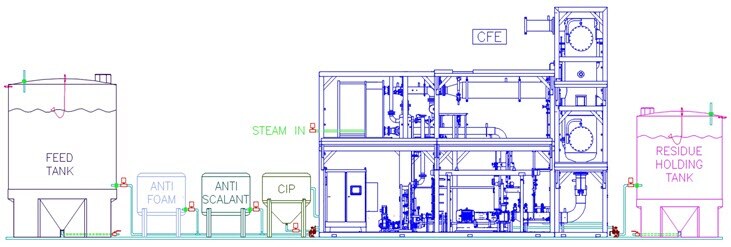
Step 1
Heating and Circulation of Wastewater
Wastewater is pumped through a feedstock heat exchanger, where it is heated by transferring sensible heat from hot condensate. It then enters the circulation loop, where it is pumped through the main heat exchanger, orifice plate, and back into the separation tank. In the heat exchanger, latent heat from compressed vapor is transferred to the wastewater.
Step 2
The orifice plate reduces the pressure of the circulating stream, causing it to flash into liquid and vapor components. These components are separated in the tank, with the liquid returning to the recirculation pump and the vapor exiting to either the atmosphere or a condenser. A mist pad at the top of the tank removes small liquid droplets from the vapor.
Step 3
Steam from the boiler provides latent heat to the wastewater in the recirculation loop via the main heat exchanger. The high-temperature condensate exits the heat exchanger, flows to the condensate tank for vapor separation, and is then pumped back to the feedstock heat exchanger to heat incoming wastewater. Once the target concentration is reached, the concentrated wastewater is purged from the system through the residue valve.
Free Application Feasibility Report
The centerpiece of our consultative approach is our complimentary bench scale analysis of your waste or process stream. This free analysis determines:
- How appropriate the stream is for evaporation
- Estimated reduction percentage
- Recommended materials of construction
- Recommended operating procedures.
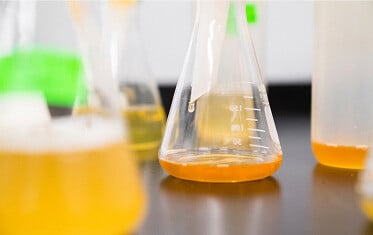
Full Range of Upgrades, Accessories and Services to Unlock Your Evaporator’s Full Potential
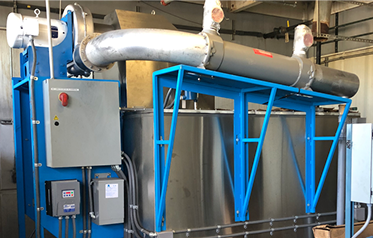
ENCON offers a full range of upgrades, accessories and services to minimize labor and maximize return on investment.
Work with our consultative Sales Engineers to spec a turn-key system
Material of construction upgrades for corrosive waste streams
Automated chemical clean in place (CIP) systems
Service contracts
Why Choose ENCON?
Superior Service & Support – We provide industry-leading technical support, ensuring customers receive prompt and knowledgeable assistance.
Consultative Sales Approach – Our expert sales engineers guide you through the process, including a detailed boil analysis of your waste stream to tailor the perfect evaporator solution.
Proven Industry Experience – With over 2,000 installations worldwide, ENCON evaporators are trusted by some of the largest companies, including 3M, GM, Ford, and Caterpillar, for their reliability and performance.
Wide Range of Heat Source Options – The most extensive selection of heat sources in the industry, ensuring the most cost-effective solution for any application.
Largest Thermal Evaporators in the Market – Designed to handle the most demanding industrial needs, with larger capacities than competitors. Proudly designed and manufactured in the USA.
Unmatched Reliability & Performance – ENCON evaporators are built for longevity, offering superior technical advantages and reliability over competitors.